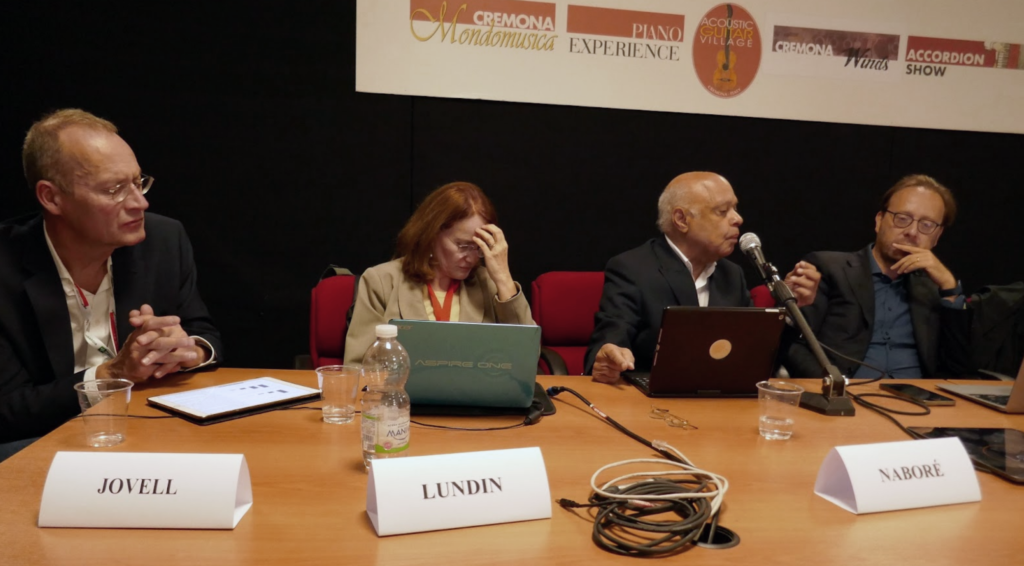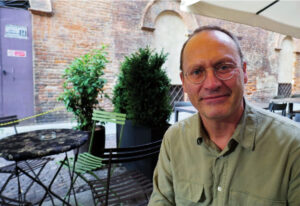Finnish Rondo Classic Joins the International Media Exchange
With an aim to present piano related material from non-English written media, Piano Street launched its International Media Exchange in 2018. We are now happy to welcome Finland’s most influential music magazine, Rondo Classic to be a part of the network. In a recent issue of Rondo (no 2, 2023), journalist Matti Tuomisto has published an article about Cremona Musica and Piano Street in Finnish, kindly offered here in a translated version for our readers.
Discovering the joy of the piano on the highway
The Swedish (but English-language) online service Piano Street, devoted to the music and art of the piano, takes the benefits of music digitalization seriously. Pianist, pedagogue and journalist Patrick Jovell has been attending the Mondomusica event in Cremona for years. He conducts interviews, reports news, relentlessly follows concerts and takes part in the international Media Lounge’s panel discussion. Piano Street’s follow-up article offers a good overview of Mondomusica’s activities.

Panel discussion on digitalization of music at Mondomusica in Cremona in September 2022. From left to right: pianist and journalist Patrick Jovell, pianist and cultural manager Milica Lundin, pianist and teacher William Naboré and, as moderator, pianist Roberto Prosseda, artistic director of Mondomusica.
In September 2022, Jovell opened the discussion of music digitalization at the Mondomusica panel seminar, observing that in Sweden, the first steps were taken already 30 years ago. The benefits of the skills thus acquired were highlighted during the pandemic. Nevertheless, he has described his own relationship with digitalization as sceptical.
In the years 2016–20, Jovell served as the president of the Swedish EPTA (European Piano Teachers Association), and today he is an honorary member of the organization.
‘We regularly report to EPTA members on digitalization, such as attempts to teach piano technique remotely. We have also raised awareness of gamification, i.e. using the resources of the gaming world for music education, for example, learning notes to read musical scores like a computer game’, Patrick Jovell explained.
The use of digital tools in music education has been studied in Sweden and the trend is gaining momentum. Almost half of the teachers at music schools use digital tools such as videos. On the other hand, educators have been thrust head first into the digital world, usually without training. Patrick Jovell feels that many things are hard to achieve in distance education, where direct contact between teacher and student is lacking. The teacher must abstract himself, so to speak, and consider what actually works remotely. ‘How do you teach piano pedalling via a digital connection, for example?’, asks Jovell.
A critical attitude bears fruit
A critical attitude towards digitalization bears fruit in the pianostreet.com service. Founded in 2001, it does not play around with special features but boosts its users’ joy of discovery by focusing on the basics. Its popularity tells its own story; there are more than 100,000 registered active users from different parts of the world. The foundation of the enterprise is simply the distribution of piano repertoire, which began in 2005. ‘Piano Music’ is a category in the site’s main menu. Users who pay a monthly subscription can print and save in digital format more than 3,300 standard repertoire works from the Piano Music Library.
A treasure trove for students developing their knowledge of the repertoire is the Audiovisual Study Tool in the Piano Music menu, conveniently allowing them to follow the score while listening to the music. For example, all of Beethoven’s piano sonatas are found here.
Looking at his Piano Sonata No. 1 in F minor, the sheet music alternatives are the Urtext and the Ruthardt edition, and the listening choices are Schnabel, Arrau, Barenboim, Brendel and Scherbakov. There are differences in pianists’ renditions, and Piano Street nourishes the listener’s curiosity with these expert choices.
Piano Street offers much that is free of charge, but by paying a monthly fee you get considerable benefits and like access to the huge Naxos Music Library (and therefore not exclusively to piano music), which can be found in the Resources menu.
The basic activities are the evaluation of new piano recordings, the pre-announcement of live-stream concerts and the production of news and articles in-house or in collaboration with international partners. Among recent selected articles, ‘Thoughts on the Art of Practice’ by pianist Philip Fowke, showcases the joy of discovery. Rehearsing is a kind of handiwork. Fowke writes: ‘Shura Cherkassky once memorably said to me that anyone hearing him practise would think he couldn’t even play the piano.’
There is no advertising on Piano Street’s website
The team behind Piano Street – CEO Johan Sandback, David Wärn and Patrick Jovell – are all ‘living musicians’ (Patrick’s excellent characterization!), who research the users’ preferences, interests and behaviour annually, listing the most read, discussed or shared articles of the year. Only Johan is a full-time employee, while Patrick, for example, still continues to work as a teacher. When examining the Piano Street website, one thing is particularly striking – there are no banners, Google adverts or other distractions. This is an ethical choice. Jovell says that the publishing policies are decided at meetings: ‘We want to be as independent as we can, if necessary by being editorially strict.’
In Piano Street’s two decades of operation, huge changes have taken place in terms of digitalization. Through social media, everyone has become a potential content creator online. ‘In that respect, internet users have become easy targets for product branding and sales strategies, and music and related products are no exception’, says Jovell. Piano Street’s own user statistics show, however, that the greatest interest is focused on the content that supports the user’s own practice and personal development, and users receiving related feedback.

A sense of humour, intellectual sharpness and solid musicianship form a combination that has taken Patrick Jovell’s career a long way.
‘We have to think about the question of the chicken and the egg. The basis of development is education policy. Sweden should concentrate on training good music teachers who know how to nurture talent.’
Patrick Jovell reflects on our own use of time: ‘In the middle of the pandemic, we discovered that digital tools can save time. But it takes time to become good at something. I feel in my heart that we don’t really need short piano lessons, but rather long ones. Time must be given to children and their parents – I think this is very important.’
Text and photos: Matti Tuomisto, Rondo Classic, Finland
 Rondo Classic is a magazine published in Finland and in Finnish language focuses on classical music, but also naturally ventures in to musical theatre, ethnic music, jazz, and popular music. The content consists of interviews, profiles, music-related feature stories, background articles that analyse phenomena in the world of music, and articles that explore the history, composition, and performance of music. The magazine also includes columns, CD and performance reviews, and TV and streaming listings for music programmes.
Rondo Classic is a magazine published in Finland and in Finnish language focuses on classical music, but also naturally ventures in to musical theatre, ethnic music, jazz, and popular music. The content consists of interviews, profiles, music-related feature stories, background articles that analyse phenomena in the world of music, and articles that explore the history, composition, and performance of music. The magazine also includes columns, CD and performance reviews, and TV and streaming listings for music programmes.
Website: rondo.fi
Comments